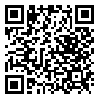BibTeX | RIS | EndNote | Medlars | ProCite | Reference Manager | RefWorks
Send citation to:
URL: http://jdisabilstud.org/article-1-2164-en.html
2- Assistant Professor, Department of Psychology, Allameh Tabataba'i University, Tehran, Iran
3- Assistant Professor, Department of Psychology, Roodehen Branch, Islamic Azad University, Roodehen, Iran
4- Assistant Professor, Department of Psychology, Payame Noor University of Tehran, Tehran, Iran
Abstract
Background & Objectives: Pregnancy and childbirth are evolutionary stages in a woman's life. Because not every woman is emotionally balanced, she may react differently to pregnancy and childbirth. The experience of women in this period profoundly affects their children and families and had long–term effects on society. Fear and poor knowledge cause anxiety in expectant mothers and increase the secretion of stress hormones in mothers. It is necessary to help pregnant women to solve pregnancy–related problems by recognizing the factors affecting anxiety, psychological wellbeing, marital satisfaction, and maternal and neonatal outcomes of these individuals. This study aimed to determine the effectiveness of cognitive–behavioral therapy (CBT) on anxiety, psychological wellbeing, and marital satisfaction of first–time pregnant women.
Methods: This applied quasi–experimental research employed a pretest–posttest and follow–up design with a control group. The study's statistical population consisted of all first–time pregnant women 20–35 years old at 20–24 weeks of gestation. They were referred to Tehran health centers, Tehran City, Iran, for monthly pregnancy examinations in 2019, and their Beck anxiety score according to the Beck Anxiety Inventory (Beck & Steer, 1991) was moderate (higher than 20). The study sample comprised 30 people, including the experimental and control groups (15 people in each group). The inclusion criteria were as follows: being Iranian, aged 20–35 years, being first–time pregnant (according to the statements of the participants), being in the 20th to 24th week of pregnancy (based on the documents in the medical file), having literacy, being singleton pregnant, lacking a history of abortion or intrauterine death and infertility (based on the documents in the medical file), not having pregnancy problems (blood pressure, bleeding, diabetes, thyroid diseases, placenta previa, fetal anomalies) (based on the documents in the medical record), lacking any accidents during the last 6 months (according to the statements of the participants), not having addiction (based on the documents in the medical record), and not receiving treatment due to psychiatric disorders (based on the documents in the medical record). The exclusion criteria included not following the group's rules in the first meeting and being absent for more than two sessions. The study data were obtained using the Beck Anxiety Inventory (Beck & Steer, 1991), Ryff Psychological Wellbeing Scale (Ryff & Keyes, 1995), and ENRICH Marital Satisfaction Scale (Fowers & Olson, 1989). Group training was administered to the CBT for 8 weekly 90–minute sessions. The obtained data were analyzed with descriptive (mean and standard deviation) and inferential statistics (variance analysis with repeated measurements and Bonferroni post hoc test) using the SPSS version 22 software. The significance level of the tests was considered 0.05.
Results: The results showed that in the variables of anxiety, psychological wellbeing, and marital satisfaction, analysis of variance for the time factor (p<0.001), the group factor (p<0.001), and the interaction between group and time (p<0.001) were significant. In the experimental group, the scores of anxiety, psychological wellbeing, and marital satisfaction variables in the posttest and follow–up stages were significantly different from the pretest stage (p<0.001). However, no significant difference was observed in the mentioned variables between the posttest and follow–up stages, indicating that the CBT effect remained constant until the follow–up stage (p>0.05).
Conclusion: Based on the findings of this study, CBT was effective in anxiety, psychological wellbeing, and neonatal marital satisfaction of first–time pregnant women. This method can be used to improve the mental health problems of expectant mothers.
| Rights and permissions | |
 |
This work is licensed under a Creative Commons Attribution-NonCommercial 4.0 International License. |





